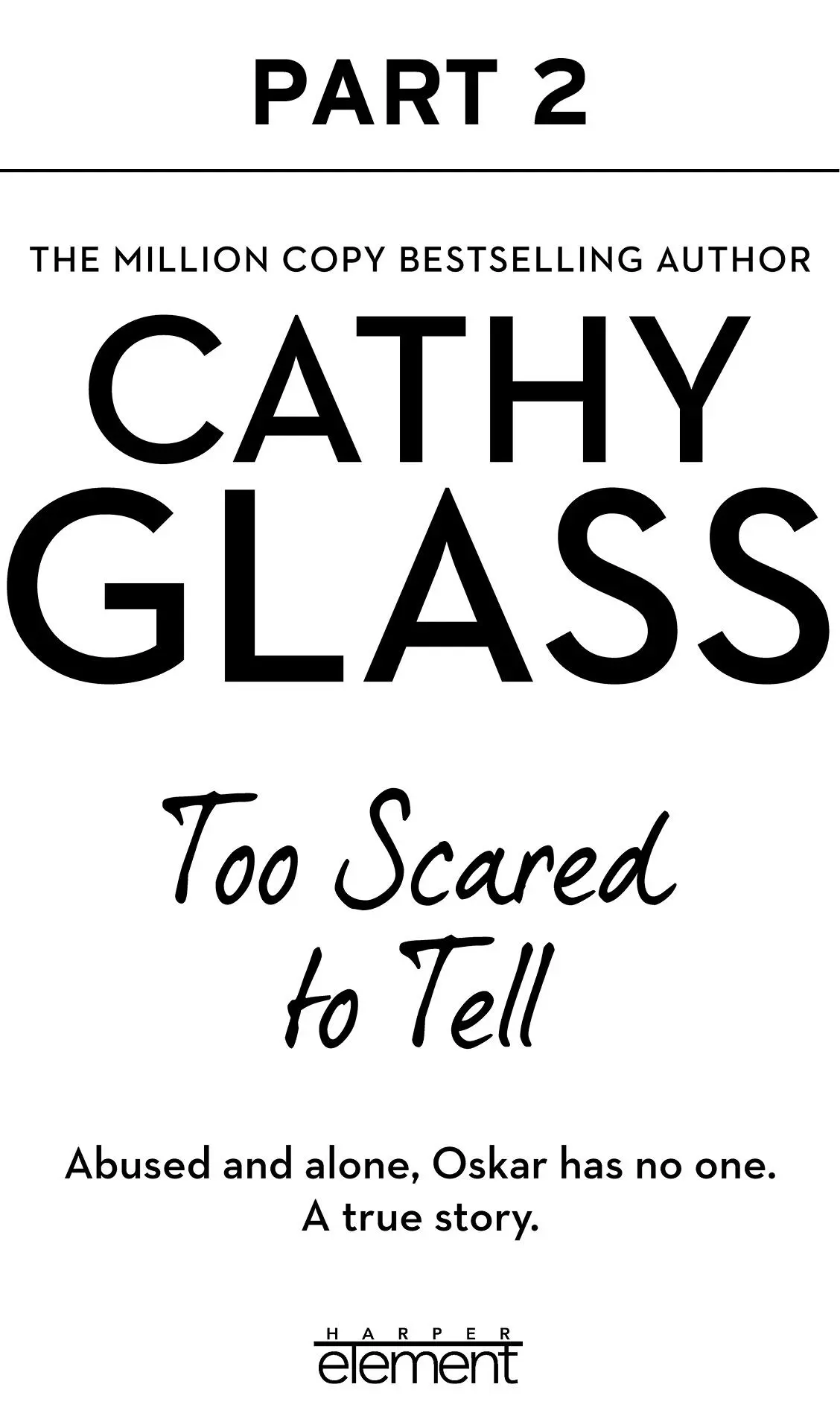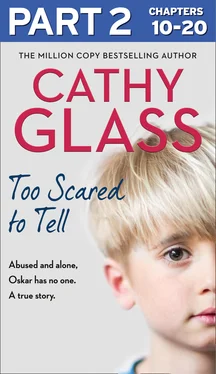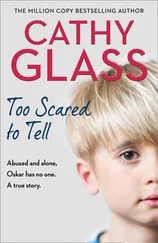
Certain details in this story, including names, places and dates, have been changed to protect the family’s privacy.
HarperElement
An imprint of HarperCollins Publishers
1 London Bridge Street
London SE1 9GF
www.harpercollins.co.uk
First published by HarperElement 2020
FIRST EDITION
Text © Cathy Glass 2020
Cover layout design © HarperCollins Publishers Ltd 2020
Cover photograph © Johner Images/Getty Images (posed by a model)
A catalogue record of this book is available from the British Library
Cathy Glass asserts the moral right to be identified as the author of this work
All rights reserved under International and Pan-American Copyright Conventions. By payment of the required fees, you have been granted the nonexclusive, non-transferable right to access and read the text of this e-book on screen. No part of this text may be reproduced, transmitted, downloaded, decompiled, reverse engineered, or stored in or introduced into any information storage retrieval system, in any form or by any means, whether electronic or mechanical, now known or hereinafter invented, without the express written permission of HarperCollins e-books.
Find out about HarperCollins and the environment at
www.harpercollins.co.uk/green
Source ISBN: 9780008380380
Ebook Edition © February 2020 ISBN: 9780008380427
Version: 2020-06-09
1 Cover
2 Title Page
3 Copyright
4 Contents
5 Chapter Ten: Contact
6 Chapter Eleven: Not Safe
7 Chapter Twelve: Mr Nowak
8 Chapter Thirteen: Review
9 Chapter Fourteen: Distraught
10 Chapter Fifteen: They Made Me
11 Chapter Sixteen: Questioned by the Police
12 Chapter Seventeen: Sickening
13 Chapter Eighteen: Family
14 Chapter Nineteen: Therapy
15 Chapter Twenty: Family
16 Moving Memoirs
17 About the Publisher
Landmarks CoverFrontmatter
List of Pages v vi 95 96 97 98 99 100 101 102 103 104 105 106 107 108 109 110 111 112 113 114 115 116 117 118 119 120121122123124125126127128129130131132133134135136137138139140141142143144145146147148149150151152153154155156157158159160161162163164165166167168169170171172173174175176177178179180181182183184185186187188189190191192193194195196197198199200201202203204205206207208209210211212213214215
Chapter Ten
Whatever had happened between Roksana and Oskar to make them so cautious of each other? I wondered as I drove home from the Family Centre. It wasn’t normal. Having been separated for three weeks, neither of them had anything to say to each other and apparently felt nothing on being reunited. Or possibly they had felt plenty, but for whatever reason weren’t able to show their emotions, with neither willing to make the first move. Hopefully they were getting along better now.
I had just enough time to go home for half an hour before I had to leave to return to the Family Centre to collect Oskar. Paula arrived home while I was there and I left her instructions on when to put the fish pie I’d made earlier into the oven so it would be ready for dinner.
I arrived at the Family Centre five minutes early, signed the Visitors’ Book and then waited in the corridor. I knew that every minute was precious to families who are separated, so I never interrupted before their time was up. As I waited, I could hear children’s voices coming from other contact rooms and a baby crying. At exactly 5.30 p.m. I continued along the corridor to Green Room. The door was closed, so I knocked and went in. The silence hit me.
Andrew had gone, the contact supervisor was at the table, writing, and Oskar and his mother were sitting side by side on the sofa, close but not touching. I assumed that whatever they’d been playing with had been packed away, for clearly they hadn’t just been sitting there for one and a half hours.
As soon as Roksana saw me she stood and began putting on her coat. ‘Good, you’re here,’ she said intensely. ‘Can you give me a lift to work? I’m going to be late.’ Oskar remained sitting on the sofa.
‘I’m sorry, I can’t today,’ I said. ‘I’ll need Andrew’s permission and he won’t be in the office now. We can ask him tomorrow and perhaps I can help you out next time.’
She tutted, picked up her handbag and threw it over her shoulder, clearly stressed at being late for work.
‘I’m sorry,’ I said again. ‘I’ll ask Andrew, although if you explain the problem to him he may be able to alter the times of contact to fit around your work.’
‘I have to rush,’ she said and, throwing a kiss at the top of Oskar’s head, called goodbye as she ran out the door. Oskar stayed where he was on the sofa.
I would have liked to help her, but if she and Oskar were in my car it would have constituted a form of contact, so I needed Andrew’s permission. I knew that Roksana worked as a cleaner in various offices, and if they were on my way and Andrew agreed then I’d been happy to drop her off next time. Alternatively, as I’d suggested to her, contact arrangements might be adjusted to fit around her work, although the centre was only open from 9.00 a.m. to 5.30 p.m., Monday to Friday. I appreciated it was difficult for parents who worked full-time, but seeing their children was usually a priority.
Oskar stood, picked up his jacket and came to me, tucking his hand into mine. I gave it a reassuring squeeze said goodbye to the contact supervisor, and we left. ‘Did you have a nice time?’ I asked Oskar as we walked down the corridor.
He shrugged.
‘Did you play some games with your mother?’ I tried.
‘Yes.’
‘Good.’ I signed out of the Visitors’ Book. ‘What did you play?’
‘The games you got from the shelf.’
‘Anything else?’
‘I can’t remember. What’s for dinner?’
‘Fish pie and green beans.’
Usually when I collected a child from contact they were brimming over with excitement, wanting to tell me what a fantastic time they’d had with their parents and then counting off the days until their next contact. Oskar didn’t mention seeing his mother all evening, and his reaction was worrying. I hoped I would be given some feedback from the contact. My experience in the past was that this was sporadic. Sometimes the social worker passed on feedback and other times they didn’t. It’s very useful if the foster carer is given a brief résumé of what happened in contact so we are better able to deal with any issues that may arise from it or questions the child might ask.
After dinner, when there was just Oskar and me in the living room, I asked him, ‘Were you happy to see your mother?’ For I really didn’t know.
‘Yes,’ he said, but his face was expressionless, as it often was.
‘Are you happy to see her again?’ I asked. It wouldn’t be his decision, but it was important we knew his feelings.
‘Yes, but she has to work,’ he replied, his voice flat.
‘I know, but she and Andrew can make some arrangements that suit her. It’s important you see each other, isn’t it?’
‘Is it?’ he asked.
I hid my shock. Most children would know how important it was to see their parents.
‘I think so. She loves you, and you love her, don’t you?’
‘Yes, but she has to work,’ he said again. ‘Can I go to bed? I’m tired.’ Which was Oskar’s way of telling me he didn’t want to talk about his mother any more. But then he never wanted to talk about her.
Читать дальше













